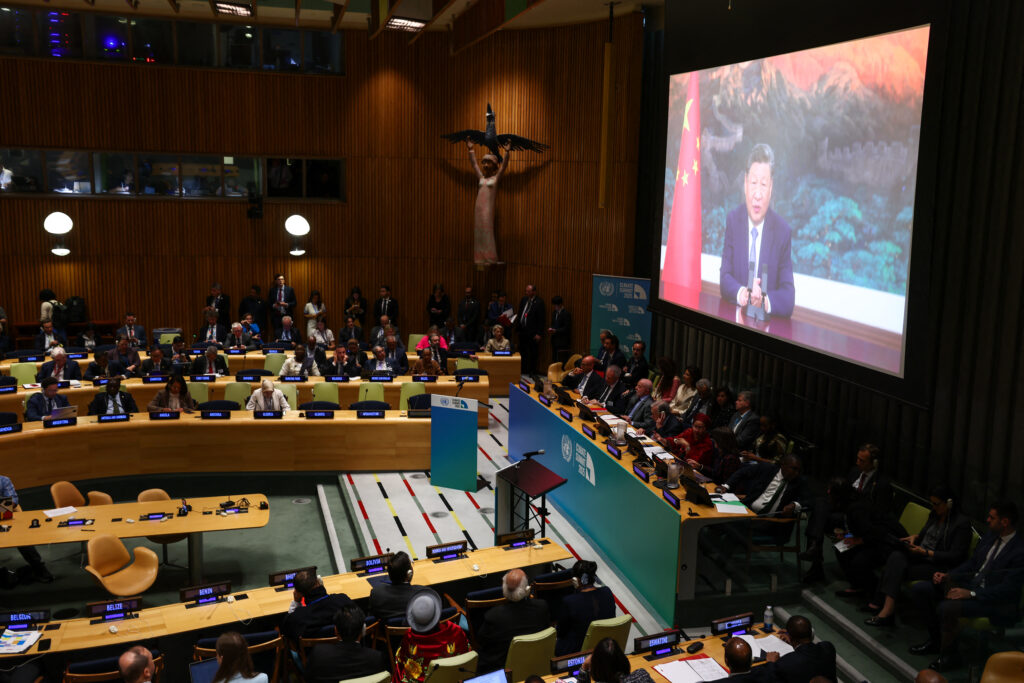An international coalition of more than 1,400 governmental and civil conservation organizations has called on its members to increase efforts to curb fossil fuel extraction and work toward a global fossil fuel non-proliferation treaty.
The International Union for Conservation of Nature adopted Motion 42 on Thursday, explicitly calling fossil fuel production a threat to nature, and urging its member groups to accelerate the transition away from fossil fuels.
In a news release announcing the motion, the IUCN called its nonbinding resolution “the strongest language ever adopted in a multilateral forum on the supply of oil, gas and coal.”
“Today is a historic moment for global conservation,” Ralph Regenvanu, Vanuatu’s minister for climate change adaptation, energy, environment, meteorology, geo-hazards and disaster management, said in the news release. “For the first time, the IUCN has recognised what science has been telling us for decades: we cannot protect nature while expanding fossil fuels.”
The resolution highlights the negative impacts of fossil fuel extraction on climate change, biodiversity and human rights, and urges member states to support implementation of the Paris climate agreements and other international accords while creating an equitable transition away from fossil fuels and ending new fossil fuel projects.
It seeks action on the supply side of fossil fuel systems, targeting fossil fuel extraction, not just consumption. The document notes that most international agreements are focused on fossil fuel use and emissions, adding “there is a legal gap in the governance of the extraction and supply of fossil fuels.”
Regenvanu cited the International Court of Justice’s recent advisory opinion that governments are legally required to address climate change, calling the IUCN resolution as “long-overdue leadership and courage the world needs.”
“The Pacific has long been calling for a just and equitable phase out of coal, oil, and gas because our survival depends on it,” Regenvanu said. “Now the conservation movement has joined us.”
The resolution calls on the IUCN’s World Commission on Environmental Law to “develop an analysis and assessment of governance gaps in existing international frameworks related to fossil fuel supply and just transitions as well as the relevance, importance, and complementarity of the Fossil Fuel Non-Proliferation Treaty,” and urges member groups to “accelerate just transition pathways” in developing countries.
This story is funded by readers like you.
Our nonprofit newsroom provides award-winning climate coverage free of charge and advertising. We rely on donations from readers like you to keep going. Please donate now to support our work.
Donate Now
The IUCN has member organizations in 160 countries, including many government conservation agencies and environmental groups like The National Audubon Society, The Center for Biological Diversity and The Nature Conservancy.
“After 30 years of climate talks, it’s clear that we need additional tools to push countries to transition rapidly off fossil fuels, so this is a welcome step,” Ben Goloff, a senior climate campaigner at the Center for Biological Diversity, said via email. “This is especially true when the United States, the world’s largest oil and gas producer, is turning its back on climate diplomacy.
“It’s good to see an international body like the IUCN moving to expand the tool kit and pushing its members to get off the fossil fuels driving the extinction and climate crises.”The IUCN Members Assembly formally adopted the motion at its World Conservation Congress in Abu Dhabi, UAE, where it said more than 10,000 attendees from 189 countries gathered for a week of sessions “aimed at setting the conservation and sustainable development agenda for decades to come,” the group said.
About This Story
Perhaps you noticed: This story, like all the news we publish, is free to read. That’s because Inside Climate News is a 501c3 nonprofit organization. We do not charge a subscription fee, lock our news behind a paywall, or clutter our website with ads. We make our news on climate and the environment freely available to you and anyone who wants it.
That’s not all. We also share our news for free with scores of other media organizations around the country. Many of them can’t afford to do environmental journalism of their own. We’ve built bureaus from coast to coast to report local stories, collaborate with local newsrooms and co-publish articles so that this vital work is shared as widely as possible.
Two of us launched ICN in 2007. Six years later we earned a Pulitzer Prize for National Reporting, and now we run the oldest and largest dedicated climate newsroom in the nation. We tell the story in all its complexity. We hold polluters accountable. We expose environmental injustice. We debunk misinformation. We scrutinize solutions and inspire action.
Donations from readers like you fund every aspect of what we do. If you don’t already, will you support our ongoing work, our reporting on the biggest crisis facing our planet, and help us reach even more readers in more places?
Please take a moment to make a tax-deductible donation. Every one of them makes a difference.
Thank you,

















